
Hari Hari,
Satsvarupa Maharaja is totally exhausted. In the last six weeks he has had thirty-nine days with guests or visitors, two hospital days and the July 5 Book Festival. This past week he has been having two headaches per day which have dissipated with Excedrin. Traditionally in the summer season he has received an increase of “fair-weather friends,” but this was overly intense and not healthy. Fortunately there is some relief ahead for two and a half weeks; during that time are three major festival days (Baladeva Jayanti, Janmastami and Radhastami), quietly observed.
Baladeva
ANNOUNCEMENT
GN Press Needs / Services Available
We need to expand our team of proofreaders as we aim to increase the rate of republication of Satsvarūpa Mahārāja’s books as well as new books that he writes.
This includes a need for fluent bilingual Spanish and English speakers to proofread Spanish translations (we currently have around 20 Spanish translations waiting to be proofread).
Anyone interested in this particular service should contact Manohara dāsa at [email protected]
If you would like to help, please contact Kṛṣṇa-bhajana dāsa at [email protected] or [email protected] and we will find you a service that utilizes your talents.
The primary place of japa in a Prabhupada disciple’s life is clear. “Of all the regulative principles, the spiritual master’s order to chant at least sixteen rounds is most essential.” (C.c., Madhya 22.113, purport) In another place, Srila Prabhupada writes, “The first regulative principle is that one must chant the Hare Krsna maha-mantra loudly enough so that he can hear himself, and one must vow to chant a fixed number of rounds.” (C.c., Antya 11.24, purport)
******
Srila Prabhupada was aware that some of his disciples failed to chant the minimum quota and he didn’t take it lightly. “The Krsna consciousness movement is based upon this instruction of Lord Caitanya Mahaprabhu, that one must chant the Hare Krsna maha-mantra regularly and according to the prescribed principles. We simply ask our Western students to chant at least sixteen rounds a day, but sometimes we find that they fail to chant even these sixteen rounds . . . Sri Caitanya Mahaprabhu’s cult is based upon the chanting of the Hare Krsna mantra. . . . We, the members of the Krsna consciousness movement, must strictly follow this advice of Caitanya Mahaprabhu.” (C.c., Adi 16.15, purport).
This order stands not only for beginning students, but for everyone, even a paramahamsa. “Haridasa Thakura and the Gosvamis were all engaged in chanting a fixed number of rounds; therefore chanting on beads is very important for everyone …” (C.c., Madhya 4.125, purport)
******
I am doing extra rounds for now, but I don’t expect to keep it up after these three weeks (nine days left). Maybe I will keep the Ekadasi increase. But I have other duties to do, so I have to be content with my quota of sixteen. Maybe in the future, Krsna and Prabhupada will indicate to me that my other duties are not as important and I should spend more time chanting. Haridasa Thakura spent all his time chanting, as did Raghunatha dasa Gosvami, and toward the end of his life, Bhaktivinoda Thakura. As I write this, I am not trying to advocate that I or other devotees should chant more than sixteen rounds at all times. What I am trying to advocate is that those sixteen rounds should be done better. That is the reason we increase our quota—to break the bad habits and overcome the offenses. Increased numerical strength is the remedy for offensive chanting. “Papa-ksayas ca bhavati/ smaratam tam ahar-nisam: ‘One becomes free from all sinful reactions if one chants day and night, following the recommendation of Sri Caitanya Mahaprabhu.’” (Bhag. 6.3.24, purport)
******
And by the way, where did you get those wooden japa beads? They are not tulasi, are they? Don’t you know Vaisnavas are supposed to chant only on tulasi beads? And how come you don’t know more Sanskrit or Hindi or Bengali? That puts you at a considerable disadvantage, you know. Why haven’t you memorized the standard Vaisnava songs? I also notice you have difficulty mastering the basic concepts of Vaisnava siddhanta. Do you know what alambana is? Do you know svarsiki? Do you even know sankhya, Vedanta? All right, I don’t want to embarrass you, but you should at least learn to tie your sikha in a knot and put the tilaka on the twelve parts of your body. Where is your Bhagavad-gita? What temple do you belong to? Who is your GBC man? What is your service? Do you know how to properly pronounce your own spiritual name? Oh, very good. And let me ask you a simple question of philosophy: tell me the meaning of the word bhava.
******
You want to be a part of the spiritual world, of Krsna’s pastimes in Vraja. It is beginning to happen. But so far, it is not that real to you. You have only been hearing it for a few years, and it has only been a few months since you gained the focus that this should be the goal of your life. For many years and lifetimes, a file has accumulated, filled with so many real and imagined adventures (they are all actually mayic misadventures). So you cannot be part of any world right now. You cannot sink roots into this earth, and neither can you fly to Goloka. You cannot entirely give up your sense of self in this world, and you are tired of playing the center of existence. The condition of your japa reflects this confused state of being.
******
I am not confused, but “between worlds” is a more accurate word. Arjuna also felt this and expressed it to Sri Krsna: “But for Yourself, there is no one who can remove this doubt.” Arjuna thought that if he followed Krsna’s instructions for self-realization, then he would have to give up his hopes for happiness in this world. But what if he failed to attain the transcendental goal? Then he would be neither here nor there, but be like a small cloud torn apart from a big cloud and floating loose in the big sky. Lord Krsna assured his friend that one who does good never meets with evil. Even if Arjuna could not completely succeed on the path of bhakti, there would be no loss. Whatever gains he had made would be continued in the next life.
Therefore, if we cannot chant with attention right now, chant anyway and chant more. Make efforts to control the mind. Discuss the aparadhas in chanting and be alert to when you may be about to commit them. Be glad if you don’t feel part of this world. Go on hearing the pastimes of Radha and Krsna. Associate with devotees and avoid those who would destroy your faith and enthusiasm. Your devotional activities are all gains. They often seem comical because of the awkward place you are in, so there is no harm in having a laugh at yourself. At least you won’t become proud that you are an accomplished taster of rasa.
******
By coming to the japa retreat, I have, after a week, mostly removed or reduced the first line of distraction. That is, the daily concerns of my work, my personal relationships, and so on. I have been chanting better even though I cannot get free of the second line of maya’s attack—the old memories. I appreciate now that this mail package has arrived how much the distractions have lessened.
Chanting with the distraction of my day-to-day life makes me want to get my rounds done. There is business to take care of and people to deal with. This is an offensive attitude toward the holy name; it prevents me from loving Krsna in His nama-rupa.
******
Did you ever have the impression that someone was hurrying you and trying to get rid of you? I think of a clerk at the information desk of the passport office in Manhattan. Her function is merely to decide who should go where as they try to apply for their passports. If you try to settle your affairs with her or ask her a more detailed question, she gets rid of you with a rude, “Who’s next?” Do we deal with harer nama like that? What to do?
pp. 531-33
A devotee is not supposed to ask anything of the Lord (akama), but I pray for ability and endurance to finish this volume and all the rest scheduled to glorify Srila Prabhupada in his biography.
On what basis do I pray that I should be the one who does this work? If I am replaced, surely Krsna can send a better writer and devotee to do it. How can I claim it is not for me selfishly, but for the world? I cannot. It is true, I am tainted.
Then I pray, “Lord, make me pure to do this book since I have begun it. Stick with me, but make me more fit.”
Give me patience to work hard, divine inspiration to find the ways and means in words to make his divine life “come to life” for the world’s readers. Grant me devotion to remember Srila Prabhupada day and night and set down accurately his words, gestures, and deeds.
Let me grasp his preaching mission and express it to the full extent. Let me learn from others what I cannot grasp about him myself. Grant me work a day determination to make a careful work rendering. Grant good fortune to my associates who are working with me on this.
Is it wrong to pray in this way? Is this sakama? I pray for protection and guidance to do this, and whatever You do with me, I pray to accept it in the spirit of tat te ‘nukampam su-samiksamano.
Fasting. Now go and chant before Their Lordships Sri Sri Radha-Madana-mohana.
krsna krsna krsna krsna krsna krsna krsna he
krsna krsna krsna krsna krsna krsna krsna he
krsna krsna krsna krsna krsna krsna raksa mam
krsna krsna krsna krsna krsna krsna pahi mam
rama raghava rama raghava rama raghava raksa mam
krsna kesava krsna kesava krsna kesava pahi mam
hare krsna hare krsna krsna krsna hare hare
hare rama hare rama rama rama hare hare
Bahudak singing bhajanas, explaining to Indians sitting on the lawn that fifty years ago everyone in India would hear krsna-katha in the evening, not turn on the color television. Pointed talks for them. One quite old Indian has bleached blond hair. He’s singing or making comments. I also led kirtana and preached a half hour on Brahman, Paramatma, Bhagavan.
Now Bahudak is reading how Brahma heard the message from Krsna (Visnu) that the Lord would appear.
Some children here run wildly. I’m up in my room. Any minute they’ll come in and we’ll have our own reading, then break fast.
The reason I left the program on the lawn is that I wanted to avoid the woman dancer who is supposed to perform at 9 P.M.
They expect me to speak something about Srila Prabhupada.
I have proof that I am a rascal, and therefore how can I speak of him? I know I should arouse love, but feel I cannot (so many worthy, worker-disciples are praising him that I feel, “What is the point of also raising my voice!” Not a very noble feeling).
Overcome it. Is it so difficult to praise Srila Prabhupada from innumerable different angles? No, it’s like diving in the ocean. I may not be the best diver or swimmer, but by his grace, I will be able to float.
Bahudak said that because they feel I’m sincere, they appreciate whatever I say. That’s my point:
The most blessed event! Let me realize!
The day he came into the world to save us. And we Godbrothers, we should be pleased at each others’ devotion, not envious of each other. For myself, let me acknowledge the more advanced achievements of my GBC Godbrothers.
Feeling almost let down since becoming somewhat disengaged from the more intense labors of the biography. Eager to get myself into greater challenges of meditating, researching, and working on the next volume—his years in’ India.
I pray to discharge my duty and speak of him.
I feel unable to write of his life.
I feel—how can I deliver souls back to Godhead?
How can I completely relinquish sex desire, desire for praise from others?
Fear. Pain.
Please, Gurudeva, give me the strength to bear “all trials and troubles,” and yet I am Gurudeva myself. How can it be? How can I possibly be reciprocating, be “merciful” and “compassionate” to the degree described and desired by my disciples?
We are demanding from them: don’t minimize the guru. On your behalf, he performs his own service; he accepts your service and offers it to Krsna.
He was a great emperor and possessed all the opulences of his acquired kingdom. He was so exalted that he was increasing the prestige of the Pandu dynasty. Why did he give up everything to sit down on the banlc of the Ganges and fast until death?
Saunaka Rsi tells more details of Maharaja Pariksit’s life up to the point where he renounced his kingdom. It’s no surprise that a learned person should know so much about the emperor of the world, especially the deeper meanings—what’s behind the news reports. Newspaper reports never get to the root of anything, even when they make a so-called in-depth analysis.
The Srimad-Bhagavatam may sometimes tell of the same events covered in other books on world history, but we know for certain that when we hear something from the Bhagavatam, we are getting the substance and the transcendental connection. Whatever Sukadeva says will be centered on Krsna; his version will explain whatever there is to be known.
Once, some of Prabhupada’s scientist-devotees asked Prabhupada if there was a contradiction between Sukadeva’s version and the version of the material scientists concerning the structure of the universe. Prabhupada replied that there might be some difference, but by listening to Sukadeva Gosvami we would become liberated and go back to Godhead, and that is the real point of knowledge.
The details of the Kuruksetra war were known to all people living at that time, and perhaps they were even available to be read in different written accounts, but only those who heard from Krsna in the Bhagavad-gita could understand His involvement in it and his identity as the Supreme Personality of Godhead. Lord Krsna says that if someone hears from Him, he will learn everything noumenal and phenomenal and there will be nothing left to be known.
Maharaja Pariksit was not an ordinary person who might retire from household life with no effect on society. A hint of his inestimable greatness is given in this brief description by Saunaka. Maharaja Pariksit received the rule of the whole world as an inheritance from his grandfathers, Maharaja Yudhisthira and Arjuna. Furthermore, he was doing well in the administration of the kingdom. ‘Therefore, it is especially shocking to hear that he had renounced his duties and gone to sit by the bank of the Ganges.
In this culture, we usually rejoice when a politician retires. He didn’t fulfill his promises or lead the citizens in a way that had any real benefit anyway. We hope he’ll do better as a simple citizen. At least he won’t be able to exploit the rest of the population. It was entirely different when Maharaja Pariksit decided to resign. When you have a maha-bhagavata as king, someone coming in the royal line from the Pandavas who is staving off the ill effects of Kali-yuga, his leaving is extremely inauspicious. You can imagine how bewildering the news must have been for his subjects. “This is astonishing, and therefore all were eager to know the cause.”
We want to read the historical accounts in the Bhagavatam with faith in our sampradaya’s conclusion. Of course, nondevotees don’t see it that way. How can they believe that the world was once ruled by one king, and that some emperors, such as Bali Maharaja, even ruled the heavenly planets? All we can offer is that the nondevotee learn to understand knowledge by the same process we ourselves employ. We too were once nondevotees adhering to the methods of empirical speculation. We accepted only recent histories as accurate and did not accept scripture as offering a viable account. Gradually, by hearing from the spiritual master, we came to expand our understanding. Now we may offer to the nondevotees the same process of sabda-brahma, hearing from scripture, as the flawless method of attaining spiritual and material knowledge.
That scriptural accounts do not always conform to empirical study is not a reason to reject scripture. Histories kept by the empiricists are filled with mistakes, contradictions, and omissions. Our conditioning forces us to overlook those discrepancies, however, because we have been trained to accept what we see jn print as truth. Not only what we see in print, but especially what has been written by the Western speculators.
Besides the actual historical facts, the basic truth taught in the Vedas is obvious: nations are splintering and the world is being torn apart by war and corrupt administrations. All of this is an indication of the degradation predicted for the age of Kali.
Ordinary karmis sometimes become envious when hearing about the fortunes of great devotees. They may criticize that Maharaja Pariksit inherited his kingdom, or that he was fortunate to be able to renounce his work in order to sit by the bank of a river. Karmi means absorbed in karma. If the karmi wants to have the same fortune or degree of renunciation as a devotee, he has to practice the disciplines that Maharaja Pariksit practiced throughout his life. Maharaja Pariksit was absorbed in spiritual study throughout his life, even while providing guidance and protection to the world.
If we want to cultivate absorption in spiritual study, we have to perform austerity. Although Lord Caitanya did not ask us to perform severe forms of tapasya in this age, He did insist that we chant the holy name of the Lord. Without performing that austerity, spiritual advancement is not possible. Genuine austerity means to accept trouble in order to advance the Krsna conscious mission. If we want to strive for bhakti, we’ll find that denying the body’s constant demands will enhance our devotional service…. There is nothing for us to do but to take shelter of the direct Krsna conscious practices. We cannot expect a government’s protection or good guidance. Rather, we have to follow the path of the previous acaryas and go back to Godhead.
pp. 99-103
As I turned back from the halfway point, I noticed that all the directions are much darker than that one point on the horizon. Of course, this is natural because the sun rises in the east, but I also took it as a revelation from Krsna, who opened the sky for me in just one place, giving me hope. Now I have to turn back to what looks like darkness, but with remembrance of Krsna’s special mercy. In other words, He is telling me what can be if I just persist on the path.
āśliṣya vā pāda-ratāṁ pinaṣṭu mām
adarśanān marma-hatāṁ karotu vā
yathā tathā vā vidadhātu lampaṭo
mat-prāṇa-nāthas tu sa eva nāparaḥI know no one but Krsna as my Lord, and He shall remain so even if He handles me roughly by His embrace or makes me broken-hearted by not being present before me. He is completely free to do anything and everything, for He is always my worshipful Lord, unconditionally.
Prabhupada summed up the mood of this verse in one phrase, “There is no business exchange.” Srimati Radharani’s love is unconditional. She confesses that sometimes Krsna is unfaithful, but if that’s how He likes to be in His sporting mood with other gopis, then let Him enjoy to His heart’s content. Of course, Radharani will not tell Krsna this directly, but here in this verse we see Her actual, all-loving heart. She may show Krsna Her mana (jealous anger), but She is never really angry with Him and never unfaithful to Him. In fact, if by being unfaithful to Radharani, Krsna is pleased, then Srimati Radharani says that the distress that He gives Her is the best of Her happiness.
The mood of this verse is beyond our grasp, and not only because it is in the conjugal rasa. Conjugal rasa is beyond us because it appears to be like the sexual affairs between men and women in this world. As long as we have even a trace of inclination for material sex life, then we are disqualified to understand the conjugal rasa.
But we are kept at a distance from this verse for another reason. The surrender and abandon of all happiness and sense gratification which Srimati Radharani symbolizes is frightening to us. How could we give up everything for Krsna? Is this really the demand and the conclusion of Krsna consciousness? Can’t we keep anything for ourselves? We dwell in foolish conceptions of surrendering to Krsna and at the same time living out our notions and desires for sense gratification. Pure devotional service (anyabhilasita-sunyam) is without sense gratification, including the sense gratification of mental speculation and knowledge for the sake of knowledge. Prabhupada writes plainly, “A devotee should engage himself exclusively for the satisfaction of Krsna, without personal motives, and that will make his life successful.” And he quotes Srila Bhaktisiddhanta Sarasvati Thakura as saying that “a devotee does not care about his own happiness and distress; he is simply interested in seeing that Krsna is happy. For that purpose, he engages in various activities.”
We ask the rhetorical question, “Oh, when will that day be mine when I can taste the nectar of chanting Hare Krsna?” When we ask that question, do we really want to know the answer? Because if we do, the answer is right here. That day will come, that nectar will appear for us when our standard of happiness is that Krsna should be pleased. As long as we cling to a separatist attitude that our happiness and Krsna’s happiness are separate, then we cannot know the nectar of chanting the holy name. We will not be calling out His names in earnest. Or, we may be earnest and sincere, but it won’t be for pure love of Krsna. At the present moment, we cannot attain such pure love, but Lord Caitanya gave us the Siksastakam and by it, the vision of what to strive for, what to yearn for.
“The pure devotional service in Vrndavana is like the golden particles in the River Jambu. In Vrndavana there is not a trace of personal sense gratification. It is to advertise such pure love in this material world that Sri Caitanya Mahaprabhu has written the previous verse and explained its meaning” (Cc., Antya 20.62).
Lord Caitanya composed these eight verses to teach people in general, and He personally tasted their meaning, Siksastakam.
We have been lucky to receive this Siksastakam in Srila Prabhupada’s translation and to witness the emphasis he placed on these prayers by putting them so prominently at the beginning of his Srimad-Bhagavatam opus. They are the most sublime prayers, covering all the stages of devotional service in chanting, and therefore, they are an ideal accompaniment for our japa walks and japa talks.
Since I have to leave now, I would like to thank the devotees who have come with me by reading these meditations and gropings in a forgiving way. I claim to walk alone, but I know that we cannot live alone. Even Krsna does not stay alone, but is surrounded by His pure devotees. I should not even think that I am a devotee, a Vaisnava, so I thank the devotees of Prabhupada and the previous Gaudiya Vaisnavas for allowing me to chant with them and to place my unsteady feet on the path which they have trod and left for me to follow. All glories to the holy name of Krsna and Radha, and all glories to the chanters of those holy names. All glories to Srila Prabhupada. Chadiya vaisnava-seva nistara payeche keba.
pp. 97-99
I am the essence of saintly association,
sadhu-sanga:
“We have each come
not just for the philosophy
but because of a devotee.”
The voices of saintly association
are the friendly sages
who sat together at Naimisaranya
and spoke of Krsna.
A conditioned soul gets attracted
to be with them.
Devahuti first had her father;
he was saintly association
because he was Manu,
but he turned her over
to the great yogi, Kardama,
and he became her husband and great friend.
She served him in austerity
and begged to have a son by him.
He consented,
and the incarnation Kapila was born.
Then she had the best son
for sadhu-sanga,
and He taught her sankhya.
She called him the axe to cut her attachment.
She said He was her transcendental eye
to lead her out of darkness of ignorance.
He spoke to her
the words of truth.
At the end she was alone,
but by then she was able
to always think of the Lord.
In a former life
Narada was a simple boy;
by saintly association
he became a great sage,
and then by his association a
hunter became a devotee.
There is another example:
Some dirty hippie boys
in New York City in 1966
met Srila Prabhupada.
Like for me
it was Prabhupada.
(I came to see him
like Devahuti,
who approached her son
in a solitary place, and asked him
“I am sick of my own material desires.
Please get me out
by Your association.”)
In that storefront,
in Lower East Side summer
out of the desolate decay of my youth,
I clutched at his association.
I took it like a hungry man
takes his food.
“O spiritual master,” I asked,
“is there a stage we can advance to
where we don’t fall down?”
“Yes,” he said.
He was my fatherly guide.
Association means you want to be with them,
and you can’t stand being without them.
Like G. dasi,
she can’t stand just being
with her husband.
He has a good heart;
he is a machinist and works hard
and comes home at night.
But she is chanting Hare Krsna.
He doesn’t like it.
She wants to serve Krsna not him.
She rises two in the morning chanting
and runs off
leaving husband and children behind
and joins the devotees,
“Like a gopi,” she says,
which is an exaggeration
because the gopis
ran out from their husbands
to join Krsna
in the dead of night,
but they were the world’s greatest devotees!
There is no higher standard than they.
They were mad after His association.
But G. dasi, also, runs,
to be with the devotees of Krsna,
and her husband yells after her,
“Take your clothes and don’t come back!
Go live with them!”
He doesn’t mean it
because he is Hindu;
he also respects the sadhus
as long as they don’t demand too much.
And the same day
he accompanies his wife
along with two boys and one girl,
and they go to see the sadhu
and give him a check,
and the guru consoles G. dasi,
“Be balanced, serve both
your husband and Krsna.”
Faithful hearing has to be solidified
by sadhu-sanga.
You want to be with
those like-minded in devotion.
You only want to be with those
who talk about the Lord
and dress His Deity form
and sing His praise and read His book
and do His work, and they find no taste
in anything else.
Those who stay with saintly persons
have gone to the next stage.
There is no surrender unless you learn it.
And if you think you have nothing to learn from them? Illusions. . . . One preacher, he didn’t think
they could teach him anything.
But that was his pride.
Pray to be with them.
(TO BE CONTINUED)
pp. 1, 20-23, 49-51
Dear Srila Prabhupada,
Please accept this or it’s worse than useless.
You have given me spiritual life and so my time is
yours.
You want me to be happy in
Krsna consciousness. You want me
to spread Krsna consciousness,
working with my brothers
in the society for Krsna consciousness.
Please accept these lines
made so I can recollect you,
made in separation from you.
from the back of a van in EuropeT1
two years before your Centennial
Each of us is alone, Prabhupada, and we need to
protect a little territory which is our soul.
I mean protect it from being unduly influenced.
We want to be entirely influenced
and impressed by you
and by Narada and by Hare Krsna vibrations,
but you know what I mean—
you don’t want “Yes men,” carbon copies,
superficially jolly haribols.
We’re tested by action. You see whether we
are willing to sell your books or do something
equivalent.
What did we do for the sankirtana movement?
Did we attract others to the lotus feet
of the Lord? Do we defy the atheists,
willing to fight them—
what is our credit?
My Prabhupada. Find him in the
temple room of the rented house.
They expect me to sing “samsara”
because I’m the oldest.
Okay, but sometimes I’m not going to
lead as they expect. I’ll be silent
and think of him in my own way.
The Prabhupada 12-inch murti
leans slightly backward,
a spotlight from the ceiling shining down upon him.
These Czech bhaktas prostrate
themselves fully before him—
they furiously distribute his books, I don’t
dare make fun of them.
Just serve and be simple.
Your master is in every line
of the “samsara” song.
Dear Prabhupada, in about an hour
we start in our van for
the farm somewhere in the hills
of Czech Republic.
I hear they go out early there and work
in the fields, stop at 3 P.M.
for their daily Srimad-Bhagavatam class.
I guess you would approve.
Can I do some good there?
Please visit me, or rather,
never leave me.
I’m counting on writing my way to you,
it’s my festival of preaching,
my obedience, the way
I command,
the way I face the opposition.
I offer it all at your feet.
Let me go all out as you did
in those years in India
after your spiritual master’s disappearance.
You didn’t care to develop buildings
or manage the institution—you
wrote with pen or typewriter,
you wrote without even knowing
who would publish or read it.
You wrote Science of Devotion and
Talks With Ramananda Raya and
Isopanisad and King Kulasekhara’s Prayers
and many BTG essays and
Easy Journey.
I can’t write like you but
still it is writing,
I am yours,
please don’t disown me,
this thing I’m writing is
a raid on the inarticulate, a
stab at the demons’ stronghold.
On your order
I used to place the letters in the sign
announcing your evening lecture
at 26 Second Avenue.
I think I still have that service.
Please don’t reject me.
Sweet morning arati, dimmed lights
in an old Czech farm building,
men on one side,
women and children on the other.
The pujari is a woman about six feet two inches tall.
Little Gaura-Nitai Deities are before us
and the visitor from America
leads the singing. Lots of guests from a nearby town,
friends of Krsna,
varnished floors,
light arising outdoors over the forest hills.
The train comes by very close and warns by horn—
keep those horses away!
Srila Prabhupada, I will speak of you
to these devotees today. I’ll tell them
of the old days in New York City,
tell them you wanted this farm.
We couldn’t grasp your vision,
couldn’t see the future when there would
be mangala-arati in a farmhouse in Czech.
We only knew the Lower East Side.
But now I’m here to see it:
everyone bows down to Srila Prabhupada.
Tell them
how he looked to me that summer,
how he drew me to him.
We will sit under the tree in the evening,
the devotees in their work clothes.
Tell them about the Swami,
the funny stories
of the beginning.
Prabhupada, I was just outside under slim
Ekadasi moon before dawn, doing physical
exercises to keep fit for your service.
I don’t do my own thing and tag on “for Prabhupada.”
You are actually with me and
you’re the cause of my actions.
I try to be equipoised but
sometimes I have to take one side and not another.
For example, explaining something to Madhu
about ISKCON history.
My example is you. You also sometimes
had to take one side and not the other.
But you are never against anyone.
You want to help us
even when you call us nonsense.
So I was exercising for you, deep bends,
push-ups and all that, ending in pranamas
and now I’m inside, for you.
It’s to keep me close to you.
To keep me close to you.
“You are not fit for nirjana or bhajana,” Prabhupada
told his disciple Syama dasa
who was chanting 150 rounds in Mayapur.
He said and did . . . He did and said . . .
Let me get fresh images of Prabhupada,
the little things and
big decisions noted by Hari-sauri.
It’s a way to be with him.
Reading his books is another way.
You fit the pieces together
for a composite Prabhupada.
You are one of many
many, many disciples and you don’t
shoulder the most burdens.
But he keeps a place for you
and doesn’t forget
you’ve been with him since
the beginning in New York City.
He is your own
spiritual master and you have a right
to keep him very close.
You can treasure the statements he made
which make you feel special—
go ahead and take them.
It’s not that I want some illusion or
false propaganda that I’m the best son.
But I want my own relationship.
I admit I’m insignificant
but at the same time I care
for my Prabhupada devotional creeper.
You do that by cherishing
his love for you.
Is it unrealistic to say Prabhupada
is always with you?
No, he can do it.
Therefore I call them my “Prabhupada poems”
and there’s nothing wrong in that.
He is a father,
he’s got work for me to do.
pp. 97-101
This evening we read the Lilamrta chapter about Abhay’s business and family life in Allahabad. Madhu said he appreciated hearing how Srila Prabhupada applied himself to his duties in making money. Prabhupada employed his moneymaking ability later as Founder-Acarya of ISKCON. We followed the thread of spiritual life through Prabhupada’s business days as he traveled and opened his pharmacy in Prayag.
Two charming scenes: When the Gaudiya Math sannyasis come to Abhay’s Prayag pharmacy, he was joyful to see them again. At another time, Gaudiya Vaisnava sannyasis visited Abhay’s home. The aged Gour Mohan De mistook them for Mayavadis and was unfriendly. When Bhaktipradipa Tirtha Swami started to speak, Gour Mohan De realized his mistake, “Oh you are Vaisnavas!” he exclaimed, and bowed at their feet.
Ganga said, “Prabhupada’s father set a good example for his son to follow.” The chapter ends with a description of the photo of Abhay with shaved head, observing his father’s passing away:
There is a mysterious, spiritual air about him, as one might expect in a meditating saint . . . He looks as if he is and always was a sadhu, and he has suddenly been revealed as such on this day.
There is so much to learn about Prabhupada….This Wicklow house is very peaceful, so it was a real silence—no wind or birds, no cars or planes or people. I waited in that silence, wondering about death. But then I thought, “There’s still time for me to work. Let me go to the porch and write.”
According to the photo, when Gour Mohan De got very old, his eyes dimmed and he might have suffered from palsy. These years before old age are the most crucial. The light will fade. Write as much as you can.
Tomorrow I’ll rise early and come here to write. Srila Prabhupada’s books are stacked on the desk, and maybe they will speak to me. I was going to say, “They’re on the desk and I can reach out to them.” But it’s more like they’ll reach out to me.
Prabhupada, your devotees live all over the world. Sometimes they get in car accidents and they die. They want to think of you and Lord Krsna. You’ve taught us what to do in life and at death, “Whoever thinks of Me at the end of life—he comes to Me.” You have taught us what we need to know, but we need you to stand by us, to come to us. “Everything is there,” you said. No one is excluded. Let us serve you.
My crazy dance,
my kirtana dance.
I whirl around
like a young man, happy.
In the center for a while,
and then another bhakta spins in,
and I stand on the edge clapping
before the Deities and Srila Prabhupada.
Oh, those crazy dancers!
Staid devotees leave the kirtana hall
as the young ones stomp.
My writing is like that, a wild dance,
with happiness expended
and energies expended
in service of the Lord before His altar,
with guitar and Western drum,
leaping as high as I can.
I have seen photos of Srila Prabhupada smiling at the antics of his Western disciples. In one picture it looks like he almost wants to refrain from smiling. His teeth aren’t showing, but he can’t help but be amused, and his eyes show that he is pleased to see that the devotees are at least enthusiastic. He permits them to sing and dance in their own way, as long as it’s within bounds. They work hard, so if they look a little strange and don’t dance exactly like Gandharvas, and if their Sanskrit is sometimes wrong, pronouncing “goru” (cow) instead of “guru” (spiritual master), Srila Prabhupada overlooks it. He says, “I am guru, not a cow, but I realize they don’t mean it wrongly. They cannot always pronounce the Sanskrit correctly, that’s all.”
And sometimes we ate too much, some of us. We had lots of faults. We’re working them out. We know we need to be more cultured. And we want to increase our family members. As the movement grows in many countries, we cannot expect that everything will be done just as it is in India. Krsna consciousness will have its Western flare:
Sometimes our Indian friends, puffed up with concocted notions, criticize, “This has not been done. That has not been done.” But they forget this instruction of Narada Muni to one of the greatest Vaisnavas, Dhruva Maharaja. One has to consider the particular time, country and conveniences. What is convenient in India may not be convenient in the Western countries. Those who are not actually in the line of acaryas, or who personally have no knowledge of how to act in the role of acarya, unnecessarily criticize the activities of the ISKCON movement in countries outside of India. The fact is that such critics cannot do anything personally to spread Krsna consciousness. If someone does go and preach, taking all risks and allowing all considerations for time and place, it might be that there are changes in the manner of worship, but that is not at all faulty according to sastra. . . . The formalities may be slightly changed here and there to make them Vaisnavas.
—Bhag. 4.8.54, purport
pp. 61-69
Don’t be left behind
I want Krsna. He’ll take
me. But not if I’m not a real
refugee.
A refugee flees war
but a stowaway seeks only
a free ride.
I want that refugee passion, O Lord,
the need
to be with You.
I pray to be a leader who takes
many with me
unselfish like Prahlada. I am not a mauna
vrati in the Himalayas. I must
bring people with me—bring them
or don’t go myself
We Hare Krsna people
have been told to give gallons of blood
and not to simply to help ourselves
find the higher taste
Save yourself and
save others
clear and pure
no petty cowards.
Someone said, “All you know
is your books and
papers, writing, not people-
feeling.”
What of Krsna Himself? Perhaps the greatest stowaway was baby Krsna. He asked (or allowed) His father Vasudeva to carry Him away from Kamsa’s prison so that he would not be killed by Devaki’s wicked brother. Devaki begged Him to go.
Vasudeva agreed. He told Krsna that he had given his word of honor to hand over all his children to Kamsa to be killed. Now that Krsna had appeared, he was willing to cheat. “I must save You!”
When Vasudeva lifted the Lord, who had assumed the form of a baby, the chains binding Him broke, the iron doors fell open, and the guards fell asleep while father and son braved the storm. The Yamuna parted and Vasudeva, Krsna crossed safely. Some say He was led by a fox; others say He fell into the water so that Yamuna-devi could receive His blessing. Whatever happened, He made it safely to Gokula, the sweetest abode. M. Yasoda had just given birth to twins and was exhausted. Under Yogamaya’s direction, Vasudeva placed Krsna in Yasoda’s arms and picked up her daughter. That girl was Yogamaya herself, and she later appeared to Kamsa as Durga-devi. Actually, she scared the daylights out of Kamsa when he tried to kill her.
Yeah, that’s the best, when
Krsna said, “Take Me,
take Me in yourrs
arms
dear father.” He wasn’t
afraid of Kamsa but wanted
to give His childhood to
the people of Gokula
Stowaway. Stowaway in a basket,
Karna. Stowaway Rahu and disguised
too. As if he were just
another deva. He
lost his head!
Objects can also be stowed—gold
in the Himalayas—so much it could
help in the horse yajna. So Krsna sent
Dhananjaya there when they were broke.
Go to stow, cheap, do it for Krsna,
hide away for a million years
and come out when He needs
you.
But as for me, I’d like to spring
back to Godhead ASAP.
Not like the five-thousand-year-old
Aztec painting in perfect shape
just found in Guatemala.
Air stored in and out of nostrils
chest and blood in and out
of the abdomen—no
immortality for this cat
no matter
how much he eats or drinks
today.
“A Few Examples of Visitors who Should Have Stayed at Home” (by Mark Little, from Quora.com):
As world travel has increased over the last five hundred years, so have incidents of biological clash, such as the appearance of a tropical seaweed, Caulerpa taxifolia, in Mediterranean waters, where it threatens local sea life. Some famous examples of guests who outstayed their welcome are the African honeybees introduced to South America; the European snails that escaped from a gourmet’s escargot farm and are now devouring the state of California; or the starling, one hundred of which were released in New York’s Central Park in 1890 by a club of Shakespeare fans as part of a hare-brained scheme to introduce all the birds mentioned by the Bard.
The traffic has worked both ways. The blight which caused the Irish potato famine in the mid-nineteenth century may have come from America. Another devastating example of an imported menace is the vine-root louse, Phylloxera, which arrived in France with some vine cuttings from America and began to attack the local vines, which unlike the American stock, had no built-in resistance to the pest. First detected in 1868 in Bordeaux, within twenty-five years it had all but wiped out most of the vineyards in France, Spain, Portugal, Germany, and Italy.
Starlings on the loose! How crazy!
Can’t they train those millions of birds
hopping around?
And me announcing truth to you
as to how they must be understood
in later years
Those starlings, these
stowies! I’m taking it
easy, easier.
Don’t wear my medals anymore.
Will tell my no-holds-barred stories
but won’t eat those starlings
only remember
that I was there too in
Central Park
with Swamiji.
The starlings let us sing
our Hare Krsna mantra
later we were applauded
at the Louis Abolafia love-in
and now we are hopping
all over the world.
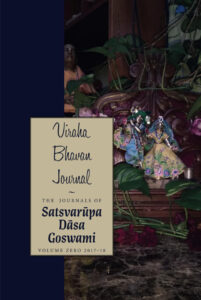
Viraha Bhavan Journal (2017–2018) was written by Satsvarūpa Mahārāja following a brief hiatus in writing activity, and was originally intended to be volume 1 in a series of published journals. However, following its completion and publication, Mahārāja again stopped writing books, subsequently focusing only on what became his current online journal, which began in August of 2018.
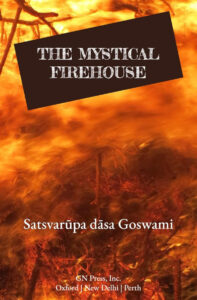
At first, I took it hard that I would have to live surrounded by the firemen, and without my own solitude. After all, for decades I had lived in my own house with my own books and my own friends. I was also now a crippled person who couldn’t walk, living among men who did active duties. But when Baladeva explained it to me, how it was not so bad living continually with other firemen and living in the firehouse with its limited facilities, I came to partially accept it and to accept the other men. I came to accept my new situation. I would live continually in the firehouse and mostly not go outside. I would not lead such a solitary life but associate with the other firemen.
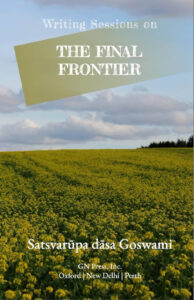
Let me write sweet prose.
Let me write not for my own benefit
but for the pleasure of Their Lordships.
Let me please Kṛṣṇa,
that’s my only wish.
May Kṛṣṇa be pleased with me,
that’s my only hope and desire.
May Kṛṣṇa give me His blessings:
Kṛṣṇa Kṛṣṇa Kṛṣṇa Kṛṣṇa Kṛṣṇa he
Rāma Rāghava Rāma Rāghava
Rāma Rāghava rakṣa mām.
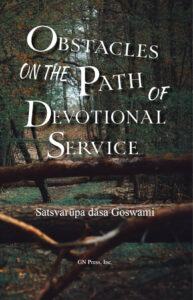
You mentioned that your pathway has become filled with stumbling blocks, but there are no stumbling blocks. I can kick out all those stumbling blocks immediately, provided you accept my guidance. With one stroke of my kick, I can kick out all stumbling blocks. —Letter by Śrīla Prabhupāda, December 9, 1972.
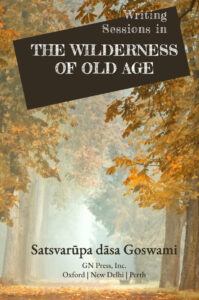
The Writing Sessions are my heart and soul. I’m trying my best to keep up with them. I am working with a few devotees, and they are far ahead of me. I wander in the wilderness of old age. I make my Writing Sessions as best I can. Every day I try to come up with a new subject. Today I am thinking of my parents. But I don’t think of them deeply. They are long gone from my life. Śrīla Prabhupāda wrote a poem when he was a sannyāsī, and he said now all my friends and relatives are gone. They are just a list of names now. I am like that too. I am a sannyāsī with a few friends. I love the books of Śrīla Prabhupāda. I try to keep up with them. I read as much as I can and then listen to his bhajanas.
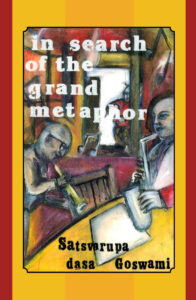
The metaphor is song. Explain it. Yes, particulars may not seem interesting or profound to readers who want structured books.
Wait a minute. Don’t pander to readers or concepts of Art. But Kṛṣṇa conscious criteria are important and must be followed. So, if your little splayed-out life-thoughts are all Kṛṣṇa conscious, then it’s no problem.
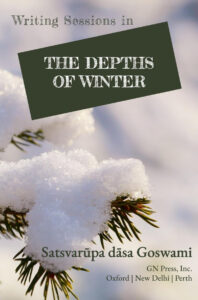
I am near the end of my days. But I do like the company of like-minded souls, especially those who are Kṛṣṇa conscious. Yes! I am prone to Kṛṣṇa consciousness. I have been a disciple of Bhaktivedanta Swami Prabhupāda for maybe almost sixty years. Sometimes I fail him. But I always bounce back and fall at his feet. It is a terrible thing that I sometimes do not have the highest love for him. It is a terrible thing. Actually, however, I never fall away from him. He always comes and catches me and brings me back to his loving arms.

This edition of Satsvarūpa dāsa Goswami’s 1996 timed book, Upstate: Room to Write, is published as part of a legacy project to restore Satsvarūpa Mahārāja’s writings to ‘in print’ status and make them globally available for current and future readers.
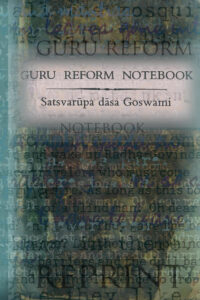
A factual record of the reform and change in ISKCON guru system of mid ’80s.
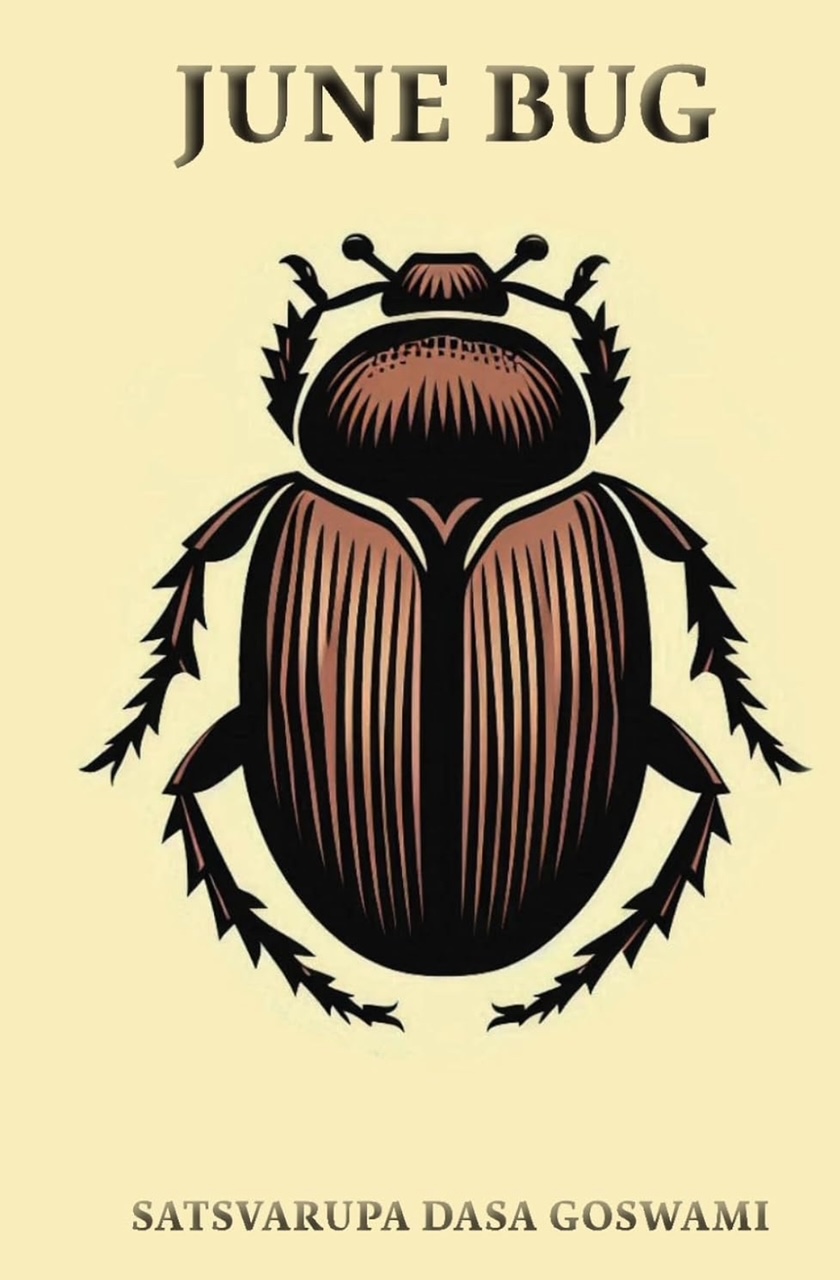
Readers will find, in the Appendix of this book, scans of a cover letter written by Satsvarūpa Mahārāja to the GN Press typist at the time, along with some of the original handwritten pages of June Bug. Together, these help to illustrate the process used by Mahārāja when writing his books during this period. These were timed books, in the sense that a distinct time period was allotted for the writing, during SDG’s travels as a visiting sannyāsī
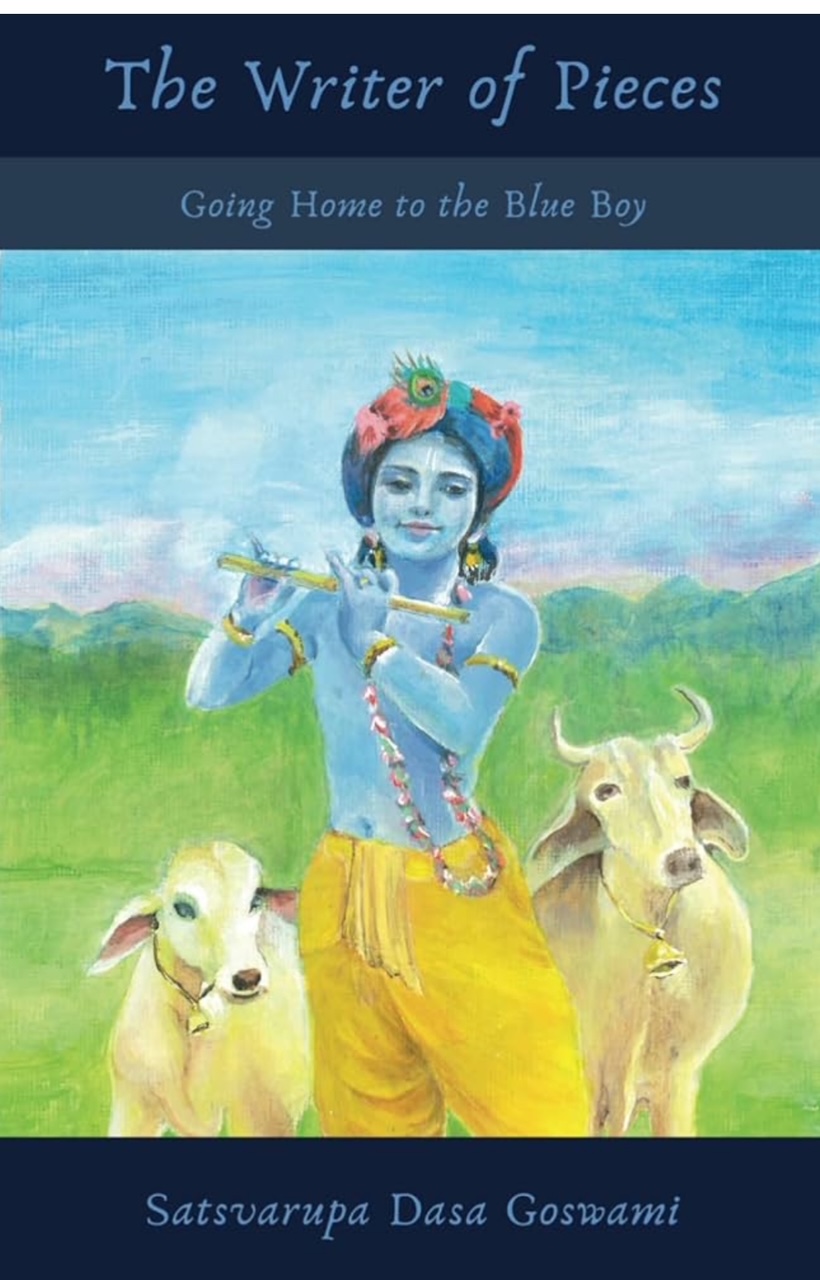
Don’t take my pieces away from me. I need them dearly. My pieces are my prayers to Kṛṣṇa. He wants me to have them, this is my way to love Him. Never take my pieces away.
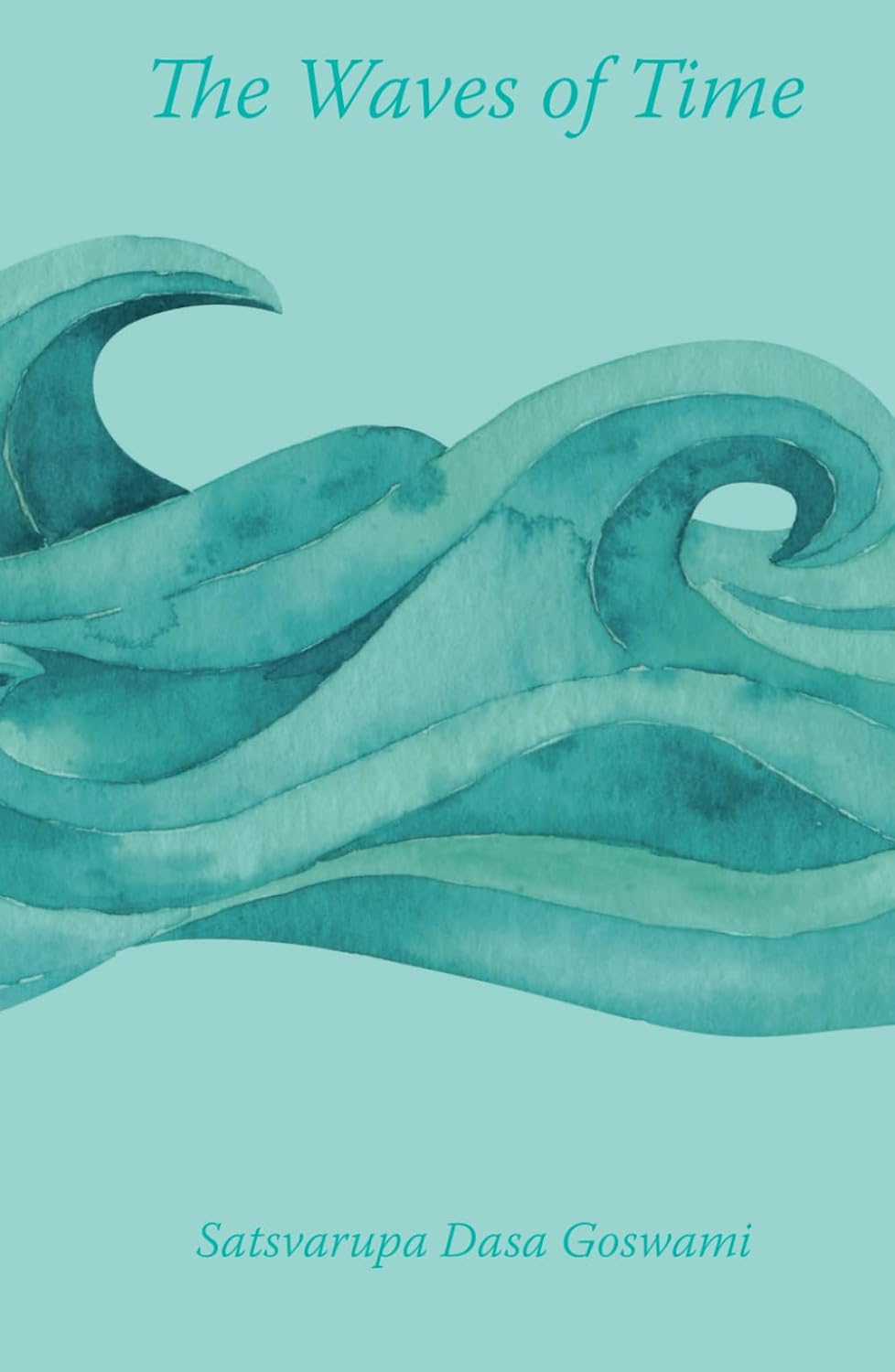
Many planks and sticks, unable to stay together, are carried away by the force of a river’s waves. Similarly, although we are intimately related with friends and family members, we are unable to stay together because of our varied past deeds and the waves of time.

To Śrīla Prabhupāda, who encouraged his devotees (including me) To write articles and books about Kṛṣṇa Consciousness.
I wrote him personally and asked if it was alright for his disciples to write books, Since he, our spiritual master, was already doing that. He wrote back and said that it was certainly alright For us to produce books.

I have a personal story to tell. It is a about a time (January–July 1974) I spent as a personal servant and secretary of my spiritual master, His Divine Grace A.C. Bhaktivedanta Swami Prabhupäda, founder-äcärya of the International Society for Krishna Consciousness. Although I have written extensively about Çréla Prabhupäda, I’ve hesitated to give this account, for fear it would expose me as a poor disciple. But now I’m going ahead, confident that the truth will purify both my readers and myself.

First published by The Gītā-nāgarī Press/GN Press in serialized form in the magazine Among Friends between 1996 and 2001, Best Use of a Bad Bargain is collected here for the first time in this new edition. This volume also contains essays written by Satsvarūpa dāsa Goswami for the occasional periodical, Hope This Meets You in Good Health, between 1994 and 2002, published by the ISKCON Health and Welfare Ministry.

This book has two purposes: to arouse our transcendental feelings of separation from a great personality, Śrīla Prabhupāda, and to encourage all sincere seekers of the Absolute Truth to go forward like an army under the banner of His Divine Grace A.C. Bhaktivedanta Swami Prabhupāda and the Kṛṣṇa consciousness movement.

A single volume collection of the Nimai novels.

Śrīla Prabhupāda was in the disciplic succession from the Brahmā-Mādhva-Gauḍīya sampradāya, the Vaiṣṇavas who advocate pure devotion to God and who understand Kṛṣṇa as the Supreme Personality of Godhead. He always described himself as simply a messenger who carried the paramparā teachings of his spiritual master and Lord Kṛṣṇa.

Dear Srila Prabhupada,
Please accept this or it’s worse than useless.
You have given me spiritual life
and so my time is yours.
You want me to be happy in Krishna consciousness
You want me to spread Krishna consciousness,

This collection of Satsvarūpa dāsa Goswami’s writings is comprised of essays that were originally published in Back to Godhead magazine between 1966 and 1978, and compiled in 1979 by Gita Nagari Press as the volume A Handbook for Kṛṣṇa Consciousness.

This second volume of Satsvarūpa dāsa Goswami’s Back to Godhead essays encompasses the last 11 years of his 20-year tenure as Editor-in-Chief of Back to Godhead magazine. The essays in this book consist mostly of SDG’s ‘Notes from the Editor’ column, which was typically featured towards the end of each issue starting in 1978 and running until Mahārāja retired from his duties as editor in 1989.

This collection of Satsvarupa dasa Goswami’s writings is comprised of essays that were originally published in Back to Godhead magazine between 1991 and 2002, picking up where Volume 2 leaves off. The volume is supplemented by essays about devotional service from issues of Satsvarupa dasa Goswami’s magazine, Among Friends, published in the 1990s.

“This is a different kind of book, written in my old age, observing Kṛṣṇa consciousness and assessing myself. I believe it fits under the category of ‘Literature in pursuance of the Vedic version.’ It is autobiography, from a Western-raised man, who has been transformed into a devotee of Kṛṣṇa by Śrīla Prabhupāda.”
 The Best I Could Do
The Best I Could DoI want to study this evolution of my art, my writing. I want to see what changed from the book In Search of the Grand Metaphor to the next book, The Last Days of the Year.
 a Hare Krishna Man
a Hare Krishna ManIt’s world enlightenment day
And devotees are giving out books
By milk of kindness, read one page
And your life can become perfect.
 Calling Out to Srila Prabhupada: Poems and Prayers
Calling Out to Srila Prabhupada: Poems and PrayersO Prabhupāda, whose purports are wonderfully clear, having been gathered from what was taught by the previous ācāryas and made all new; O Prabhupāda, who is always sober to expose the material illusion and blissful in knowledge of Kṛṣṇa, may we carefully read your Bhaktivedanta purports.

I use free-writing in my devotional service as part of my sādhana. It is a way for me to enter those realms of myself where only honesty matters; free-writing enables me to reach deeper levels of realization by my repeated attempt to “tell the truth quickly.” Free-writing takes me past polished prose. It takes me past literary effect. It takes me past the need to present something and allows me to just get down and say it. From the viewpoint of a writer, this dropping of all pretense is desirable.
 Geaglum Free Write
Geaglum Free WriteThis edition of Satsvarūpa dāsa Goswami’s 1996 timed book, Geaglum Free Write Diary, is published as part of a legacy project to restore Satsvarūpa Mahārāja’s writings to ‘in print’ status and make them globally available for current and future readers.